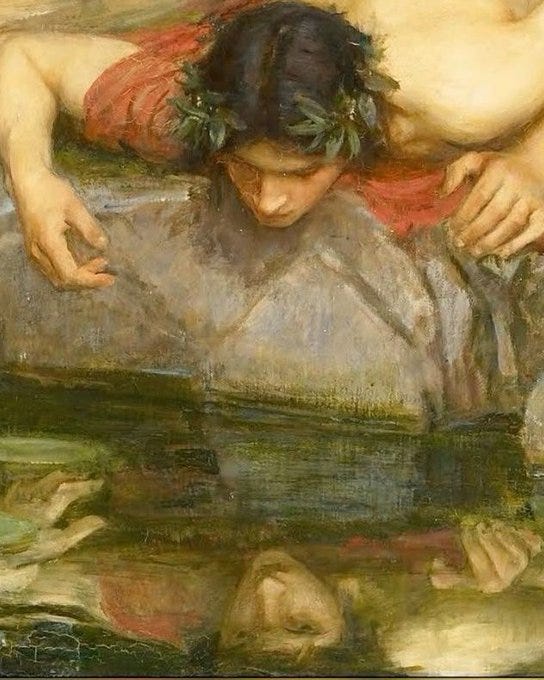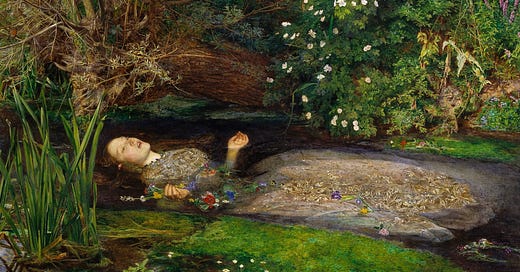Let go or be dragged: The White Lotus’s brutal lesson on desire
What the show reveals about sex, self-sabotage, and the fate of our relationships
Warning: Spoilers ahead…
When I was a child, my parents’ spiritual teacher—or rinpoche, as they’re referred to in Tibetan Buddhism—once told me that each time he became accustomed to desiring a specific meal, he would disallow himself from it: if craving chicken, he would instead eat beef, and vice versa. This is because, in Buddhism, desire is thought to be the cause of all suffering. We crave and cling to impermanent things, which is dukkah: incapable of satisfying us spiritually, no matter how good it feels in the moment. Better to let go, and stop trying to control the outcome.
This is central to the latest season of The White Lotus. In season three, we watch characters struggle with their worldly attachments—not just to money and sex, but to identity, past trauma, and the stories they tell themselves about what they need. The show has evolved from a satire of the ultra-rich into a modern-day fable about desire, death, and morality, told through the lens of Eastern spirituality. And it offers a powerful message about how, in chasing what we think will give us safety or love, we often end up recreating the very conditions we’re trying to escape.
Rick and Chelsea: Twin flames, or trauma bond?
Take Rick, for instance. He arrives in Thailand with a fixed sense of his life’s narrative: believing that his father’s murder ruined his life, and that revenge is the only path to closure. He’s so fixated on the love he didn’t receive that he overlooks the love right in front of him, taking his girlfriend’s unconditional affection for granted. Chelsea, meanwhile, thinks it’s her spiritual duty to heal Rick, tethering her self-worth to a destructive relationship.
At first, they seem like opposites. Him: a parody of masculine trauma. Her: A new-age spiritualist whose woo-woo leanings are outpaced only by her lover-girl tendencies. But they’re united by a shared belief in fate. Rick believes his life’s path is pre-determined by trauma; Chelsea thinks their story is written in the stars. Both are clinging to narratives about how life—and love—should go.
They could have let go of these narratives at any point. But they didn’t—and paid the price. Chelsea sacrifices herself trying to save someone who doesn’t want to be saved. Rick is so consumed by his story that, in pursuing closure, he ends up causing the very death he set out to avenge. This wasn’t fate; it was a self-fulfilling prophecy.
Family affairs: Narcissism, people-pleasing, and betrayal
In this season of The White Lotus, the characters who survive or grow are the ones who manage to break free from these patterns, even momentarily. Saxon’s character arc is a prime example. At the start, his entire relationship to the world is driven by the pursuit of sex. “He believes the pleasures of life are very basic,” Mike White said in one podcast episode, “and life is about wanting things and getting them.” He’s constantly privileging his own desire over everyone else’s peace, and it’s not until he hits rock bottom—a drug-fueled night culminating in a disturbing sexual dynamic with his own brother—that he’s forced to reconsider what he’s been chasing.
Saxon’s sister, Piper, is his opposite: she wants to renounce desire altogether and join a monastery, which Saxon sees as a rejection of sex and, by extension, life. Their younger brother Lochlan is a people-pleaser, constantly molding himself to fit the needs of those around him. He oscillates between Piper’s asceticism and Saxon’s hedonism: drunken threesomes one night, spontaneous conversion to Buddhism the next.
When Saxon finally confronts him about their unholy threesome—assuming it was born of actual desire—Lochlan’s response is disarmingly simple: “All you care about is getting off, and you seemed left out. I’m a people-pleaser in a family full of narcissists. I just want to give everyone what they want.” Saxon recoils in disgust.
It’s a sharp commentary on people-pleasing, and how, in violating our own boundaries to give people what we think they want, we often and end up creating bigger messes. Lochlan betrays himself in an attempt to win his brother’s approval, but it’s Saxon who winds up feeling violated.
Status anxiety: Fear, performance, and control
Their father, too, embarks on an ill-fated attempt to control the narrative. Facing the loss of his family’s fortune, Tim convinces himself they won’t survive without wealth—so better to kill them now, and avoid facing the shame of his own failure. He reverses course at the last minute, but it’s too late: Lochlan, who claims not to care about money, winds up drinking the poison. After a near-death experience, he jerks back to life—vomiting into the pool as his own reflection stares back at him.


It’s often said that the people we love are mirrors. And this is especially true for Jaclyn, Kate, and Laurie, who spend the whole week performing, betraying, and triangulating in an effort to outmaneuver their own insecurities. But in the end, it’s honesty that saves them. On their last night, Laurie reflects on her failed quest for spiritual fulfillment through love, sex, and success—ultimately concluding that she’s “just happy to have a seat at the table.” Some interpret this as acquiescence to the friendship status quo, but I think it’s meant to convey a deeper lesson: We flail and strive to impose meaning on life—but in the end, it’s not our accomplishments that give it weight. It’s time itself, and the presence we bring to the people we choose to share it with.
As a show satirizing wealth, The White Lotus has always been preoccupied with material attachments and how privilege can’t save us from ourselves. But this season takes it further, offering a moral allegory: clinging to identity, to trauma, to certainty, traps us in cycles of suffering. Again and again, we watch people reach for something higher, and fall flat on their faces, relapsing into old patterns. Some learn, some don’t. But in this season, survival doesn’t come down to who’s good or bad. It comes down to who’s willing to let go—of control, of expectation, of the need to be right or safe or chosen.
And isn’t that always the case? In real life, we cling to the relationships that make us feel secure—but as The White Lotus reminds us, holding on can be just as dangerous. In earlier seasons, the deaths felt like accidents. This season, they feel like consequences.






Terrific analysis!
I thought Lachlan was the youngest. Did I miss something?